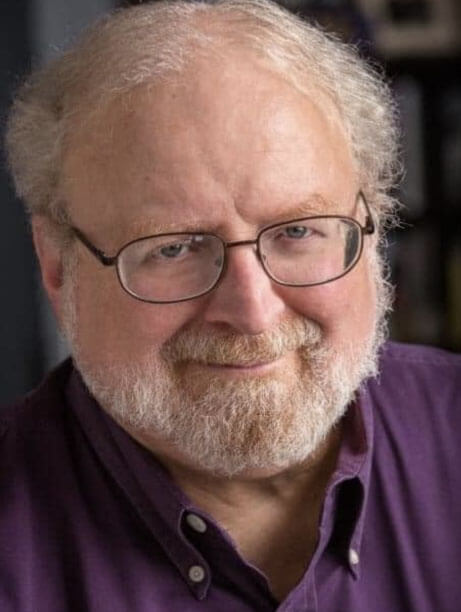Michael Griggs, director, teacher, administrator, and one of the most admired people in Portland’s theater and performance communities, died Jan. 24, 2023, in a respite care facility. He was 76.
Michael came to Portland in 1985 to take over as artistic director of the old New Rose Theatre, a classically based company that performed in a small basement space in an old Masonic Temple building that is now the Mark Building of the Portland Art Museum. He had peripheral vision artistically – he saw large pictures and made often brilliant connections – and over the years he played many other roles in Portland.
He started and ran an invigorating international performance festival at Portland State University, taking advantage of connections to Eastern European, Hispanic, and other companies and performers. He was for several years executive director of the Japanese drumming and performance troupe Portland Taiko. And he taught for several years at the professional theater school The Actors Conservatory, whose founding artistic director, Beth Harper, recalled that he “directed me in two of my favorite theater experiences: The Cherry Orchard (New Rose) and A Texas Romance (A.R.T.) … but, most importantly, he was my friend and I shall miss him with all my heart. He was the best of us.”
“Michael was a visionary – a talented director, producer, administrator and actor,” his brother Andy said in a Facebook post. “He made a mark wherever he worked, and has built a far-ranging community of friends, colleagues and collaborators in Los Angeles and Santa Cruz, CA, Portland, OR, Omaha, NE, and internationally.”
Michael loved the often unseen or ignored corners of the performance world, where he found a wealth of worth, from puppet theater to subversive comedy to agitprop to the international offerings of Boom Arts to overlooked classics by Brecht and Ibsen and others, including one of his first shows for New Rose, Federico Garcia Lorca’s The House of Bernarda Alba – “13 women and one Michael,” as performer Marilyn Stacey fondly recalled. “It was a fantastic experience to be guided by him. He was a completely caring, creative person.”
He directed independent projects that appealed to him, including a couple of plays by Oregon writer E.M. Lewis: Apple Season, in the Fertile Ground festival of new works, and last year’s Song of Extinction, which he co-directed for Twilight Theatre with his friend Kathleen Worley. And always, he considered the social and political aspects of the projects he worked on. He believed that theater ought to reflect both the aspirations and the sometimes harsh realities of the “real” world.
Michael graduated from Antioch College, earned an MFA at Boston College, and in 1974 moved with his brother Andy to Santa Cruz, California, where they founded the Bear Republic Theatre. Their brother Tom also acted in a few of the company’s productions. “We produced classics and original plays—always with a social justice awareness, for over 10 years,” Andy Griggs said.
Michael and I were friends, and would meet regularly for breakfast and general catching-up, often at the old Helser’s Café on Alberta Street or the Cadillac Café or somewhere else. He liked to meet people for breakfast, lunch, or coffee, sharing something nourishing for both body and spirit. Our meetings were often a mix of business and pleasure. When he worked at Portland Taiko he recruited me to the company’s board, where I learned a good deal from him and others about the inner workings of not-for-profit organizations. Later he joined the board of Oregon ArtsWatch, providing valuable counsel and experienced advice on such matters as writing grant proposals.
He was an extraordinary man: quiet, perhaps, but deep, and widely read, with a fine intellect, a gentle and well-tuned sense of humor, and a kind of fierce generosity of spirit: He would do what needed to be done, and what should be done. As his health failed I became one of a team (often led by his good friend, the Portland State University theater teacher Richard Wattenberg) who would take him to and from doctors’ appointments and visits to hospitals. He faced his physical challenges, many of them brought on by diabetes, with bravery and determination.
“The past several months had been difficult for him health-wise: in hospitals, skilled-nursing facilities, and most recently a respite care facility,” Michael’s brother Andy wrote. “Apparently, he died soon after a visit/discussion from a caregiver who came back into the room 10 minutes later to find him unresponsive and not breathing. Several minutes of CPR failed to resuscitate him, and he was declared dead at 3:01 p.m.”
It was a passing that took a great and generous spirit; a man who wanted his community to be the best that it could be. “He seemed to always be in the audience no matter what I was seeing, which goes to show what a staunch supporter of Portland theater he was,” the playwright Sara Jean Accuardi wrote in a Facebook post. “He was intelligent, generous, and — most importantly — endlessly curious about the world and the art he loved. I’m very grateful I had the opportunity to learn from him during my PSU days. His loss is deeply felt.”

